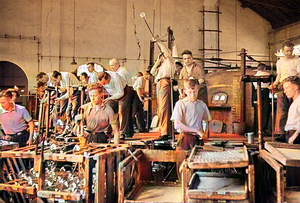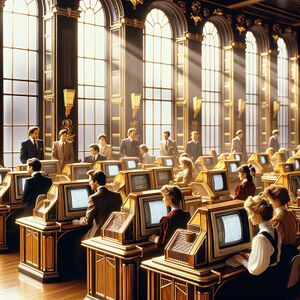GleamCo: Difference between revisions
No edit summary |
No edit summary |
||
| (6 intermediate revisions by 2 users not shown) | |||
| Line 1: | Line 1: | ||
[[File:GleamCo.png|thumb|Though modern manufacturing technology | {{Benacian Union article}} | ||
[[File:EZEC.png|left|thumb|289x289px|The EZEC was first home-computer to be made available to | [[File:GleamCo.png|thumb|Though modern manufacturing technology was used for most of the components of sandlamps, GleamCo earned its initial dominant market share by hand-sculpting bulbs to each order's specifications.]] | ||
'''The Ketsire Liveried Company of Lamp Makers''' | [[File:EZEC.png|left|thumb|289x289px|The EZEC was first home-computer to be made available to authorised subjects at an affordable price across the Benacian Union.]] | ||
'''The Ketsire Liveried Company of Lamp Makers''', trading as '''GleamCo''', is a prominent manufacturer and supplier of sodium-based lighting equipment and micro-analog computers in the [[Benacian Union]]. Founded in 1697 by [[Brugen Aldef]], it operates as a privately held company with a unique livery and charter granted by the local Chapter of the Worshipful [[Guild of Artificers]]. Aldef's political influence, stemming from his rapid and meteoric rise within the Benacian political landscape, likely influenced the terms of GleamCo's charter, leading to speculation about the nature and extent of current financial obligations towards the Guild. | |||
===== Early years and market innovation ===== | |||
Prior to GleamCo's establishment, Aldef owned a light-bulb manufacturing plant in [[Ketsire]]. Witnessing the resilience of sodium-vapor street lamps amidst the devastation of the [[Scouring]], a cataclysmic event shrouded in historical debate, sparked Aldef's entrepreneurial spirit. In 1697, he transformed his factory into GleamCo, pioneering the market for "sand lamps," luxury sodium-vapor lamps renowned for their efficiency, craftsmanship, and exceptional resistance to remnant nuclear radiation. This bold vision and the lamps' reliability attracted steady orders from the [[Cult of the Sacred Detonation]] and later, the entire Sovereign Confederation. By 1705, GleamCo had become instrumental in illuminating previously pitch-black corners, particularly those ravaged by the Scouring's electromagnetic disturbances, earning significant recognition and public favor. | |||
The | == Growth and diversification == | ||
[[File:GleamCoOffice1728.jpg|thumb|The luxurious "ORO" office rental package proved particularly popular in the humming server-reference libraries of Sovereign-based ESB [[Resident (ESB)|Residencies]].]]Recognizing the need for a skilled workforce to fuel future innovations, Aldef established the GleamCo Engineering Campus in 1711. This pioneering institute provided upskilling opportunities for existing employees and launched apprenticeship programs for aspiring youths, fostering a culture of technical competency and innovation within the company. The campus culminated in the development of the groundbreaking EZEC in 1716. The EZEC, hailed as a revolutionary home-computer, offered unprecedented access to computing power at an affordable price for authorized subjects across the Benacian Union. However, its success came at a price. Generous payment plans for the EZEC were subsidized by the [[Miþuï|Mithui]], the Union's central intelligence agency, in exchange for the covert installation of back-door systems enabling government and law enforcement access. This controversial aspect of the EZEC's design fueled heated debates and sparked concerns about privacy and state surveillance, casting a shadow over attempts to launch the product outside of the Union. | |||
With the continued upward trend in compu-fabrication technology in the early 20s, rendering high-end light fixtures secondary products, GleamCo embraced diversification. Leveraging its existing infrastructure and expertise, the company launched an office-supplies rental service that quickly gained popularity. This venture evolved into a successful bespoke office outfitting service, catering to the growing demand for modern and functional workspaces across the Union. Today, GleamCo remains a leading force in the Benacian Union's compu-fab and sodium-based lighting industry, renowned for its unwavering commitment to quality, innovation, and community engagement. | |||
EZEC-derived data terminals have been a mainstay of the [[Benacian Data Network]] since the early 1720s ''[[after Norton]]''. | |||
[[Category: Economy of the Benacian Union]] | |||
[[Category:Companies]] | [[Category:Companies]] | ||
[[Category:Benacian Union]] | [[Category:Benacian Union]] | ||
[[Category:Sovereign Confederation]] | [[Category:Sovereign Confederation]] | ||
Latest revision as of 18:42, 17 June 2024


The Ketsire Liveried Company of Lamp Makers, trading as GleamCo, is a prominent manufacturer and supplier of sodium-based lighting equipment and micro-analog computers in the Benacian Union. Founded in 1697 by Brugen Aldef, it operates as a privately held company with a unique livery and charter granted by the local Chapter of the Worshipful Guild of Artificers. Aldef's political influence, stemming from his rapid and meteoric rise within the Benacian political landscape, likely influenced the terms of GleamCo's charter, leading to speculation about the nature and extent of current financial obligations towards the Guild.
Early years and market innovation
Prior to GleamCo's establishment, Aldef owned a light-bulb manufacturing plant in Ketsire. Witnessing the resilience of sodium-vapor street lamps amidst the devastation of the Scouring, a cataclysmic event shrouded in historical debate, sparked Aldef's entrepreneurial spirit. In 1697, he transformed his factory into GleamCo, pioneering the market for "sand lamps," luxury sodium-vapor lamps renowned for their efficiency, craftsmanship, and exceptional resistance to remnant nuclear radiation. This bold vision and the lamps' reliability attracted steady orders from the Cult of the Sacred Detonation and later, the entire Sovereign Confederation. By 1705, GleamCo had become instrumental in illuminating previously pitch-black corners, particularly those ravaged by the Scouring's electromagnetic disturbances, earning significant recognition and public favor.
Growth and diversification

Recognizing the need for a skilled workforce to fuel future innovations, Aldef established the GleamCo Engineering Campus in 1711. This pioneering institute provided upskilling opportunities for existing employees and launched apprenticeship programs for aspiring youths, fostering a culture of technical competency and innovation within the company. The campus culminated in the development of the groundbreaking EZEC in 1716. The EZEC, hailed as a revolutionary home-computer, offered unprecedented access to computing power at an affordable price for authorized subjects across the Benacian Union. However, its success came at a price. Generous payment plans for the EZEC were subsidized by the Mithui, the Union's central intelligence agency, in exchange for the covert installation of back-door systems enabling government and law enforcement access. This controversial aspect of the EZEC's design fueled heated debates and sparked concerns about privacy and state surveillance, casting a shadow over attempts to launch the product outside of the Union.
With the continued upward trend in compu-fabrication technology in the early 20s, rendering high-end light fixtures secondary products, GleamCo embraced diversification. Leveraging its existing infrastructure and expertise, the company launched an office-supplies rental service that quickly gained popularity. This venture evolved into a successful bespoke office outfitting service, catering to the growing demand for modern and functional workspaces across the Union. Today, GleamCo remains a leading force in the Benacian Union's compu-fab and sodium-based lighting industry, renowned for its unwavering commitment to quality, innovation, and community engagement.
EZEC-derived data terminals have been a mainstay of the Benacian Data Network since the early 1720s after Norton.